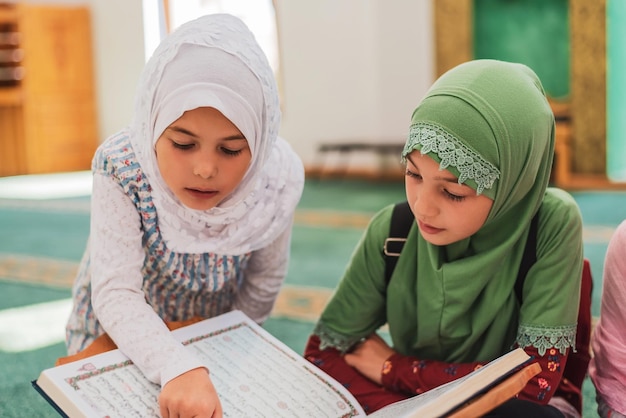In a world filled with distractions and rapid change, nurturing a child’s spiritual foundation is more important than ever. For Muslim families, providing Quran education that kids can rely on is not just a religious obligation but also an investment in character development, moral values, and lifelong guidance. The Quran is more than a holy book; it is a roadmap for a meaningful and righteous life. Teaching children the Quran from a young age instills essential values like kindness, patience, honesty, and discipline, shaping them into well-rounded individuals who can navigate challenges with faith and wisdom.
In this article, we’ll explore why Quran education is crucial for children, the benefits of online Quran classes, how parents can integrate Islamic teachings into their family routines, and why institutions like an Islamic school that Toronto families trust play such an important role in a child’s growth.
Building a Strong Spiritual Foundation
One of the greatest gifts parents can give their children is a deep connection with their faith. The Quran offers guidance for every aspect of life, from personal character to social interactions, and providing Quran education to kids early on allows them to grow up with this wisdom. Children who develop a strong relationship with the Quran are better equipped to make ethical decisions, treat others with respect, and maintain their spiritual identity, even in challenging environments.
Starting this education early helps children memorize verses more easily, understand Islamic principles, and develop a natural love for reading and reciting the Quran. This foundation lays the groundwork for them to be confident in their faith while contributing positively to society.
Quran Education and Character Development
Beyond religious knowledge, the Quran teaches universal values like justice, empathy, honesty, and generosity. By learning the Quran at a young age, children internalize these qualities, shaping their character. Parents and educators often notice that children involved in regular Quran study demonstrate improved behavior, greater emotional intelligence, and stronger problem-solving skills.
This moral compass becomes essential as they grow older and encounter peer pressure, societal influences, and life’s many challenges. Quran education creates a moral anchor, enabling children to approach life with humility, patience, and resilience.
Flexibility Through Online Quran Classes
Modern families often juggle busy schedules, making it challenging to attend in-person lessons consistently. Thankfully, online Quran classes have revolutionized access to religious education. These virtual platforms allow children to learn at their own pace, connect with qualified teachers worldwide, and enjoy personalized learning experiences.
Some of the advantages of online classes include:
- Accessibility: Children can learn from anywhere, eliminating the need for long commutes.
- Qualified Teachers: Many platforms connect families with certified Quran instructors specializing in teaching children.
- Interactive Tools: Virtual whiteboards, quizzes, and video lessons make learning fun and engaging.
- Flexible Schedules: Families can choose class times that fit their routines.
With online Quran classes, parents can ensure their children receive consistent and quality education, regardless of where they live in Canada or beyond.
The Role of Islamic Schools in Nurturing Faith
An Islamic school that Toronto parents trust provides more than academic education—it fosters an environment where children can grow spiritually and socially. Islamic schools integrate Quran studies into the curriculum, helping children develop fluency in recitation, comprehension, and memorization.
In addition, these schools:
- Offer a supportive Muslim community for children to grow their faith.
- Emphasize values like respect, responsibility, and gratitude.
- Provide teachers who model Islamic etiquette and ethics.
- Create opportunities for students to participate in Islamic events, Quran competitions, and prayer routines.
When parents combine home-based Quran education with formal instruction from schools, children develop a well-rounded understanding of both faith and academics.
How Quran Education Strengthens Families
Teaching children the Quran doesn’t just benefit them individually—it strengthens entire families. Parents who engage in Quran study with their children often develop stronger bonds, creating a shared spiritual journey. Family activities like reciting Quran together after prayers, discussing stories of the prophets, and memorizing surahs foster unity and a peaceful home environment.
Children also become positive influences on their parents and siblings, encouraging everyone to grow in faith together. A household centered on Quranic teachings cultivates mutual respect, understanding, and harmony.
Quran Education and Academic Success
Interestingly, research shows that memorization and comprehension skills developed through Quran education positively impact academic performance. The mental discipline required for memorizing surahs improves memory retention and concentration, skills that transfer to other subjects like mathematics and language arts.
Furthermore, children who grow up with strong faith and structure often perform better in school, as they have clear moral frameworks and self-discipline, both of which are essential for success.
Introducing Quran Education at a Young Age
Experts recommend introducing Quran education early, even before formal schooling begins. Young children have a remarkable ability to absorb information quickly. Starting early also makes Quran memorization easier, as children’s memory capacity is strongest in their formative years.
Parents can begin by:
- Reciting the Quran aloud to infants and toddlers.
- Teaching simple duas and short surahs.
- Encouraging children to listen to recitations from well-known Qaris.
- Creating a dedicated space at home for Quran study.
This gradual approach helps children associate the Quran with love and comfort, creating positive memories around their spiritual journey.
Practical Tips for Parents
Balancing Quran education with school, extracurriculars, and other commitments can be challenging, but these tips can help:
- Set a Routine: Dedicate a fixed time daily for Quran reading or memorization.
- Make Learning Fun: Use games, apps, and storytelling to keep children engaged.
- Be a Role Model: Children learn best by observing parents who recite and respect the Quran.
- Seek Professional Guidance: Hire qualified Quran teachers or enroll children in online Quran classes for structured learning.
- Encourage Questions: Create an open environment where children can ask questions about faith and get thoughtful answers.
Islamic Studies in Canada: A Growing Opportunity
The demand for quality Islamic studies in Canada programs is growing as Muslim communities expand across the country. Parents now have more access to local Islamic centers, mosques, weekend schools, and professional tutors.
These institutions not only focus on Quran recitation and memorization but also include lessons on Islamic history, fiqh (jurisprudence), and seerah (the life of the Prophet Muhammad, peace be upon him). Integrating Islamic studies into a child’s education gives them the tools they need to navigate Canadian society while maintaining a strong Muslim identity.
Why Quran Education Is More Important Than Ever
In today’s fast-paced, technology-driven world, children are constantly exposed to various influences. Without a strong moral and spiritual foundation, it’s easy for them to lose sight of their faith and values. Quran education for kids acts as a shield, equipping them to make ethical choices, handle challenges with wisdom, and live balanced lives. This education also promotes empathy, kindness, and community service—qualities needed in every society. By prioritizing Quran learning, parents invest in the next generation of Muslims who will lead with integrity and faith.
Final Thoughts
The Quran is not just a book to be read but a guide to be lived. Introducing children to its teachings early ensures they grow up with a clear moral compass, love for their faith, and respect for others. Whether through an Islamic school Toronto families trust, online Quran classes, or home-based lessons, parents have many options to ensure their children benefit from this spiritual treasure.
As communities in Canada continue to grow, access to Islamic studies in Canada programs will make it easier for families to preserve their faith and values. Prioritizing Quran education for kids can rely on is one of the most meaningful gifts parents can give—a legacy of knowledge, wisdom, and spiritual guidance that will last a lifetime.
FAQ’s
Q1. Why is Quran education important for children?
A: Quran education builds a strong spiritual foundation, teaches essential values, improves character, and helps children grow into confident Muslims who can navigate life’s challenges with guidance from the Quran.
Q2. At what age should kids start learning the Quran?
A: Children can start as early as age 3–4 with simple recitations, progressing to formal memorization and understanding by age 6–7, when their memory is sharp and learning habits are forming.



